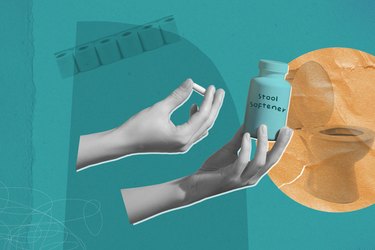
Listen, there are a ton of us who are constipated. The numbers, depending on your age, show that anywhere from 16 to 33 percent of adults have trouble going number two, according to the National Institute of Diabetes and Digestive and Kidney Diseases (NIDDK).
Some medications can help, including stool softeners. Read on to learn how these over-the-counter medications work, their side effects and the steps you should take to ease constipation before turning to meds.
Video of the Day
Video of the Day
Stool Softeners vs. Laxatives
Stool softeners are a type of laxative, also known as an emollient laxative, according to the Cleveland Clinic. They're considered a mild form of laxative, says Haleh Pazwash, MD, a gastroenterologist with Gastroenterology Associates of New Jersey.
A laxative is any medicine that encourages your body to have a bowel movement (aka helps you poop), but there are several different types, per the Mayo Clinic. Stimulant laxatives, for example (such as Dulcolax or Senokot), trigger contractions in the intestines to help push stool through the colon, Dr. Pazwash says.
On the other hand, a stool softener often contains an ingredient called docusate sodium, which softens and loosens stool, making it easier to pass, she explains.
Any type of laxative may help with constipation, but it shouldn't be your first line of defense, Dr. Pazwash says. Instead, try natural remedies for constipation first, such as adding more fiber-rich foods to your diet (think: fruits, veggies, nuts and seeds), drinking more water and getting some exercise.
You can also try adding a fiber supplement, especially if dietary restrictions or medical conditions prevent you from getting enough fiber in your diet (but it's best to check with your doctor first).
If that doesn't work, you may consider a medication to help things get going. Here are the possible side effects of stool softeners to know along with what to expect after you take one.
1. Your Gut Draws In More Water and Fat
The active ingredient in stool softeners — docusate sodium, or sometimes docusate calcium — helps increase the amount of water and fat your poop absorbs, according to the Cleveland Clinic. (This is why most stool softeners say to drink a full glass of water when taking the medication — that water helps moisten your poop.)
More specifically, docusate lowers the surface tension of stool, allowing it to accumulate more water and oil, which softens it and makes it easier to pass, per StatPearls. (So, yes, stool softeners can soften stool that is already hard.)
A stimulant laxative can get things going in just a few hours, but because of the way it works in the body, a stool softener typically takes 12 to 72 hours to "work." In other words, you might poop a day or two (or three) after taking it.
Because of this lag, "I tell patients to take a stool softener at night," Dr. Pazwash says. That way, it can get to work in your body overnight and hopefully lead to a bowel movement the next day. (This is different from other laxatives — for example, stimulant laxatives should be taken before eating, aka on an empty stomach.)
2. Your Stomach May Hurt or Cramp
Unfortunately, though a stool softener can relieve constipation (and the stomachaches that come with it), the medicine can also cause stomach pain as a possible side effect, according to the Cleveland Clinic.
As the medication begins to do its job, your GI system is going to start moving, which can trigger some cramping.
If stomach cramps are severe and don't go away, call your doctor, advises the National Library of Medicine. If they are mild, focus on staying hydrated and eat easy-to-digest foods (think: soft fruits, cooked veggies, eggs), per the Cleveland Clinic. Warmth, such as from a heating pad, can also bring relief.
3. Your Throat Might Get Irritated
You might notice a strange side effect from liquid stool softeners: throat irritation, according to the National Library of Medicine. You may also notice a lingering bitter taste, per StatPearls. That's due to the active ingredient, docusate.
To combat this, mix the medicine with milk or fruit juice to dilute it a bit, so the potentially irritating ingredients are easier on your throat. And drink plenty of water after taking it.
Warning
Throat swelling after taking a stool softener could indicate an allergic reaction, per the Cleveland Clinic. Call 911 or go to the nearest emergency room if you notice swelling of your throat, face or tongue or develop a rash, itching, hives, dizziness, rectal bleeding or difficulty swallowing or breathing.
Are Stool Softeners Safe?
Yes, stool softeners are considered safe for most people, Dr. Pazwash says. But keep in mind that these and other types of laxatives are only meant to be used for short periods (no longer than a week), to relieve occasional constipation (say, if you can't poop on vacation, or you're constipated after surgery.)
If you find yourself reaching for these meds often, see your doctor, who may want to evaluate you for conditions that can cause constipation, such as thyroid problems or irritable bowel syndrome.
Certain medications, such as those that treat hypertension, may also be behind your constipation. In extreme cases, there can be a blockage or cancer that's causing constipation, Dr. Pazwash says.
In addition, if you have rectal bleeding, unexplained weight loss, or are older than 45 and haven't had a colonoscopy, make an appointment with your doctor ASAP.
- National Institute of Diabetes and Digestive and Kidney Diseases: "Definition & Facts for Constipation."
- Colace: "3 Different Products for a #2 That's Easy to Do."
- University of Michigan Health System. "Bowel Function Anatomy."
- The American Journal of Gastroenterology. "Efficacy and Safety of Over-the-Counter Therapies for Chronic Constipation: An Updated Systematic Review"
- Nutrients: "Two Gold Kiwifruit Daily for Effective Treatment of Constipation in Adults—A Randomized Clinical Trial."
- Cleveland Clinic: "Stool Softener"
- StatPearls: "Docusate"
- Mayo Clinic: "Over-the-counter laxatives for constipation: Use with caution"
- National Library of Medicine: "Stool Softeners."
- Cleveland Clinic: "Abdominal Pain."
Is this an emergency? If you are experiencing serious medical symptoms, please see the National Library of Medicine’s list of signs you need emergency medical attention or call 911.



